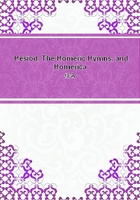
第84章 THE HOMERIC HYMNS(26)
(ll. 1-2) Strangers, a contrary wind has caught you: but even now take me aboard and you shall make your voyage.
X. (4 lines)
(ll. 1-4) Another sort of pine shall bear a better fruit (4) than you upon the heights of furrowed, windy Ida. For there shall mortal men get the iron that Ares loves so soon as the Cebrenians shall hold the land.
XI. (4 lines)
(ll. 1-4) Glaucus, watchman of flocks, a word will I put in your heart. First give the dogs their dinner at the courtyard gate, for this is well. The dog first hears a man approaching and the wild-beast coming to the fence.
XII. (4 lines)
(ll. 1-4) Goddess-nurse of the young (5), give ear to my prayer, and grant that this woman may reject the love-embraces of youth and dote on grey-haired old men whose powers are dulled, but whose hearts still desire.
XIII. (6 lines)
(ll. 1-6) Children are a man's crown, towers of a city; horses are the glory of a plain, and so are ships of the sea; wealth will make a house great, and reverend princes seated in assembly are a goodly sight for the folk to see. But a blazing fire makes a house look more comely upon a winter's day, when the Son of Cronos sends down snow.
XIV. (23 lines)
(ll. 1-23) Potters, if you will give me a reward, I will sing for you. Come, then, Athena, with hand upraised (6) over the kiln.
Let the pots and all the dishes turn out well and be well fired:
let them fetch good prices and be sold in plenty in the market, and plenty in the streets. Grant that the potters may get great gain and grant me so to sing to them. But if you turn shameless and make false promises, then I call together the destroyers of kilns, Shatter and Smash and Charr and Crash and Crudebake who can work this craft much mischief. Come all of you and sack the kiln-yard and the buildings: let the whole kiln be shaken up to the potter's loud lament. As a horse's jaw grinds, so let the kiln grind to powder all the pots inside. And you, too, daughter of the Sun, Circe the witch, come and cast cruel spells; hurt both these men and their handiwork. Let Chiron also come and bring many Centaurs -- all that escaped the hands of Heracles and all that were destroyed: let them make sad havoc of the pots and overthrow the kiln, and let the potters see the mischief and be grieved; but I will gloat as I behold their luckless craft. And if anyone of them stoops to peer in, let all his face be burned up, that all men may learn to deal honestly.
XV. (13 lines) (7)
(ll. 1-7) Let us betake us to the house fo some man of great power, -- one who bears great power and is greatly prosperous always. Open of yourselves, you doors, for mighty Wealth will enter in, and with Wealth comes jolly Mirth and gentle Peace.
May all the corn-bins be full and the mass of dough always overflow the kneading-trough. Now (set before us) cheerful barley-pottage, full of sesame....
((LACUNA))
(ll. 8-10) Your son's wife, driving to this house with strong-hoofed mules, shall dismount from her carriage to greet you; may she be shod with golden shoes as she stands weaving at the loom.
(ll. 11-13) I come, and I come yearly, like the swallow that perches light-footed in the fore-part of your house. But quickly bring....
XVI. (2 lines)
(ll. 1-2) If you will give us anything (well). But if not, we will not wait, for we are not come here to dwell with you.
XVII.
HOMER: Hunters of deep sea prey, have we caught anything?
FISHERMAN: All that we caught we left behind, and all that we did not catch we carry home. (8)HOMER: Ay, for of such fathers you are sprung as neither hold rich lands nor tend countless sheep.
ENDNOTES:
(1) "The Epigrams" are preserved in the pseudo-Herodotean "Life of Homer". Nos. III, XIII, and XVII are also found in the "Contest of Homer and Hesiod", and No. I is also extant at the end of some MSS. of the "Homeric Hymns".
(2) sc. from Smyrna, Homer's reputed birth-place.
(3) The councillors at Cyme who refused to support Homer at the public expense.
(4) The `better fruit' is apparently the iron smelted out in fires of pine-wood.
(5) Hecate: cp. Hesiod, "Theogony", l. 450.
(6) i.e. in protection.
(7) This song is called by pseudo-Herodotus EIRESIONE. The word properly indicates a garland wound with wool which was worn at harvest-festivals, but came to be applied first to the harvest song and then to any begging song. The present is akin the Swallow-Song (XELIDONISMA), sung at the beginning of spring, and answered to the still surviving English May-Day songs. Cp. Athenaeus, viii. 360 B.
(8) The lice which they caught in their clothes they left behind, but carried home in their clothes those which they could not catch.